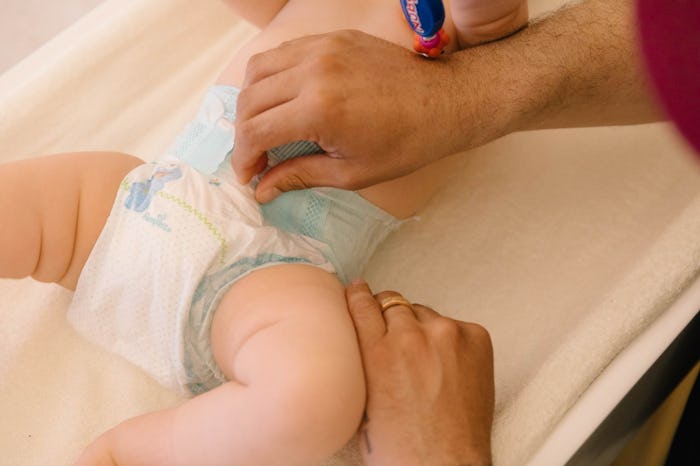Life
The Connection Between Formula & Diaper Rash Is More Complicated Than You Think
I tend to go beyond the mantra that "a dab will do ya" when it comes to diaper rash cream. I figure it can't hurt to stray on the side of "the more the merrier," right? Like any parent, I feel terrible when I change my daughter and see a glaring red rash on her bottom. When she was still breastfeeding, I would immediately begin digging for a root cause, specifically one that was linked to what I was eating. But my friends who opt for formula have similar worries, like, are formula-fed babies more prone to diaper rash?
“Formula0fed babies are more likely to get diaper rash than babies who are breastfed, though the specific reason is not clear,” says Texas-based Dr. Eboni Hollier, who is board-certified in both general and developmental and behavioral pediatrics. She adds that the increased risk of diaper rash can be due to the fact that formula-fed babies are more likely to get diarrhea and gastrointestinal illness than babies who are breastfed.
Hollier explains in an email interview with Romper that diaper rash is among the most common skin conditions in babies, regardless of how they're fed. “In fact, nearly all babies will get a diaper rash at some point during the first three years of life,” she says. “They become noticeable as bright red or ‘angry-appearing’ skin on your baby’s bottom.” The most common culprits? Wet diapers that rub against a baby’s skin, as well as irritation from urine and bowel movements. Other causes include a yeast infection, allergic reaction, and seborrhea. Hollier says babies who have more bowel movements or diarrhea are also more likely to get a diaper rash.
Switching formulas and allergic reactions to certain ingredients can also cause a diaper rash in formula-fed babies, according to Parents.
Hollier says tips for preventing diaper rash include changing diapers more frequently and as soon as you smell something funky. "This decreases your baby’s skin exposure to urine and feces, which can irritate the skin and cause diaper rash," she says. "This should be done at least every two hours in newborns and can be spaced out when baby is older and urinating less often." She also acknowledges that this can be a lot of hard work for parents who have newborns, but to "hang in there" because bowel movements will become less frequent as your baby gets older.
A little bit of naked time doesn't hurt either. Hollier says you can let your baby go diaper free for short periods of time when possible, placing your baby on a large towel in order to prevent messy accidents. Rinsing your baby's bum with warm water in between diaper changes and even using a diaper cream with every diaper change for super sensitive skin — score one for me! — is also helpful. "Look for a diaper cream with petroleum ointment (more preventative, good for daily use, and easier to clean off) or zinc oxide (thicker, may be more helpful for babies who are very prone to rash, and take more effort to clean off)," Hollier suggests.
Of course, if you think the problem lies within the formula, then consider speaking to your pediatrician about changing it up or even investigating allergies. Because in addition to saving your baby's booty, it will make your mama heart feel better, too.
